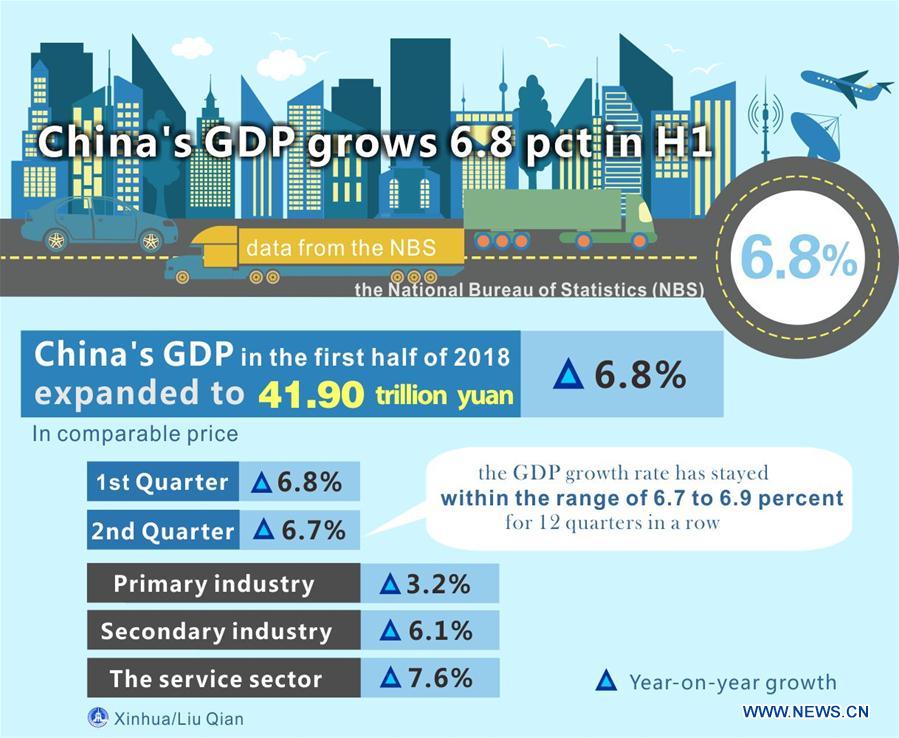
Graphics shows data released by the National Bureau of Statistics(NBS) on China's economic development in the first half of 2018. (Xinhua/Liu Qian)
by Xinhua writer Chen Yongrong
BEIJING, July 16 (Xinhua) -- China's economy expanded steadily in the first half of 2018 as continued restructuring efforts provided resilience and impetus against pressure from trade frictions.
The country's gross domestic product expanded 6.8 percent year on year in the first half of 2018, well above the government's annual growth target of around 6.5 percent, data from the National Bureau of Statistics (NBS) showed Monday.
In Q2, China's GDP rose by 6.7 percent year on year, slightly lower than the 6.8 percent from the previous quarter but representing the 12th straight quarter that GDP growth rate has stayed within the range of 6.7 to 6.9 percent, according to NBS data.
This has extended a firm expansion from last year, when China's GDP went up 6.9 percent, picking up the pace for the first time in seven years.
NBS spokesman Mao Shengyong told a press conference Monday that the Chinese economy has been running soundly in the first six months, offering "a good start" for the country's pursuit of high-quality development with further restructuring progress and improved economic quality and efficiency.
STRUCTURAL IMPROVEMENT
Despite some softening on the investment and industrial production front, many positive signs can be captured from Monday's data, reflecting China's progress in economic reform and restructuring.
The service sector expanded 7.6 percent year on year in H1, outpacing a 3.2-percent increase in primary industry and 6.1 percent in secondary industry, according to NBS.
China's private investment picked up in January-June, growing 8.4 percent year on year, which is 1.2 percentage points higher than that of the same period last year. Meanwhile, fixed-asset investment in high-tech manufacturing displayed particularly strong momentum by growing 13.1 percent.
Retail sales of consumer goods also grew 9 percent year on year in June, accelerating from the 8.5-percent rise seen in May.
"By shifting away from old growth drivers and moving up on the global industrial and value chain, China is seeing increasingly higher growth quality," said Wang Jun with China Center for International Economic Exchanges.
The domestic job market remained stable in June, with the surveyed unemployment rate in urban areas at 4.8 percent, unchanged from the level in May and down 0.1 percentage point from June last year.
China's energy consumed per unit of GDP declined 3.2 percent year-on-year in H1, exceeding the initial target of having energy consumption per unit of GDP cut by at least 3 percent in 2018.
TRADE FRICTIONS IMPACT LIMITED
While noting increasing external uncertainties, Mao said the impact of China-U.S. trade frictions, if any, would have been limited on the Chinese economy in H1.
The trade frictions unilaterally stirred up by the United States, have not put much pressure on China's domestic consumer prices, according to Mao.
He expects China's consumer prices to maintain mild growth in the second half, as the prices of food items including pork and cooking oil, likely to be pushed up by more expensive imported soybeans, are still relatively low.
Meanwhile, it requires further observation to judge the potential impact on the economy in H2, he said.
"Rising trade protectionism has posed a major challenge to world economic recovery, which has also brought us some challenges and uncertainties," he told reporters.
The trade war, ignited by the United States and currently involving 50 billion U.S. dollars, will slow China's GDP growth by 0.2 percentage points with full consideration of the second and third rounds of the impact of reduced exports on related industries, according to a research team led by central bank economist Ma Jun.
Ma, a member of the monetary policy committee of the People's Bank of China, added that the trade war would not necessarily have much impact on the capital market and exchange rates.
STEADY TREND UNCHANGED
For the rest of the year, officials and economists are confident that China's economy will remain stable as domestic demand is now the deciding force behind economic growth.
Consumption has continued to play a more prominent role in driving growth in H1, with final consumption contributing 78.5 percent of the economic expansion in January-June, up from 77.8 percent in Q1 and 58.8 percent last year, according to NBS data.
"After years of adjustment, the economic landscape has undergone profound changes as internal demand has emerged as the primary economic driving force," said Ning Jizhe, head of the NBS.
"The economy is resilient with huge potential and stamina, and will continue to operate in the reasonable range," Ning said, citing China's vast market, ongoing reform and growing new growth impetus.
Tang Jianwei, an analyst with Bank of Communications financial research center, said he expects consumption growth to continue rebounding in H2 as the recent import tariff cut and the ongoing individual income tax reform would boost consumption in the rest of 2018.
"We have the confidence, capabilities, and conditions to ensure stable and sound economic growth while pursuing high-quality development," Ning said.
(Liu Jie, Wang Xiuqiong, Zheng Xin, Lu Yun, Cheng Jing, Fang Dong, and Chen Weiwei also contributed to the story; video by Cao Ying)



